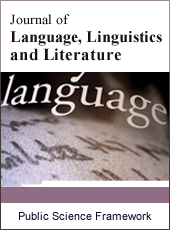Journal of Language, Linguistics and Literature
Articles Information
Journal of Language, Linguistics and Literature, Vol.1, No.3, Jun. 2015, Pub. Date: Apr. 18, 2015
English for Specific Purposes (ESP) Perspectives and Their Applicability among Science Students at Jazan University – Kingdom of Saudi Arabia
Pages: 41-45 Views: 6529 Downloads: 2189
[01]
Atef Ali Mohamed Nasr, English Language Centre (ELC), Jazan University, Jazan, Saudi Arabia.
Jazan University in Saudi Arabia offers a number of highly demanded scientific and technical majors through many academic departments, and English is used as a medium of instruction although the students' native language is Arabic. Therefore, the university administers Intensive English Language Programs (IELP) in the first year in order to develop students' linguistic skills. More specifically, at college of science wherein English is a high-credit subject in the University Foundation Year (UFY), and it is used as a means of instruction. The IELP runs for up one academic year divided into two semesters; each is 14 weeks long. The first semester is devoted to developing general English skills and is referred to as level one, whereas the second semester which is known as level two focuses on developing ESP and communication skills. The research problem stems mainly from the failure of the current ESP courses to achieve the target objectives of the IELPs. The problem is verified by conducting group interviews with the subject-matter teachers at different colleges wherein English is used as a medium of instruction. In addition, two questionnaires are conducted among subject-matter teachers, and students. From the researcher point of view, the problem is triangular in the sense that it has three sides: the ESP course's prerequisite being used in the first semester, the students, and the language teacher. The paper will discuss these three aspects in details and suggest solutions that may reduce the teaching and learning barriers of ESP materials.
Intensive English Language Programs, High-Credit Subject, General English Skills, Communication Skills, Target Objectives
[01]
Ahmedni. A. (2011) Reading Course for Saudi Business Administration Students: An Experimental Study. Bahi Publications, New Delhi, India
[02]
Afferbach, P. (1990). The Influence of PriorKnowledge on Expert Readers’ Main IdeaConstruction Strategies. Journal of ReadingResearch Quarterly, 25,1, 31-46.
[03]
BRAMKI, D. and WILLIAMS, R. “Lexical Familiarization in Economics Text, and its Pedagogic Implications in Reading Comprehension.” Reading in a Foreign Language, Vol2, No.1, 1984: 169- 181.
[04]
Carrell, P. (1987). Content and Formal Schemata inESL Reading. Journal of TESOL Quarterly, 21, 3, 461-476.
[05]
Hutchinson, T. and Water, A. (1984). HowCommunicative is ESP?” English LanguageTeaching Journal, 38, 2, 108-113.
[06]
Hussien, H. (1999). A Proposed Program forDeveloping Reading Skills AmongTechnology-of-Education Students at theFaculty of Specific Education. Unpublisheddoctoral dissertation, University of Tanta, Egypt.
[07]
Mcdonough, J. (1984). ESP in Perspective: APractical Guide. London: Collins EducationalNasr, A.(1994) The Role of Lexical Familiarizationin Understanding Specialist Texts. UnpublishedMA dissertation. CELTE, University ofWarwick, England.
[08]
Nasr, A. (2002). Reading Improvement Programamong Engineering Tarinees in Egypt.Unpublished doctoral dissertation, University ofUlster, Northern Ireland.
[09]
Pritchard, R. and Nasr A. (2004). ImprovingReading Performance among EgyptianEngineering Students: Principles and Practice.Journal of English for Specific Purposes, 23,425-445.

ISSN Print: 2381-7054
ISSN Online: 2381-7062
Current Issue:
Vol. 6, Issue 1, March Submit a Manuscript Join Editorial Board Join Reviewer Team
ISSN Online: 2381-7062
Current Issue:
Vol. 6, Issue 1, March Submit a Manuscript Join Editorial Board Join Reviewer Team
| About This Journal |
| All Issues |
| Open Access |
| Indexing |
| Payment Information |
| Author Guidelines |
| Review Process |
| Publication Ethics |
| Editorial Board |
| Peer Reviewers |


